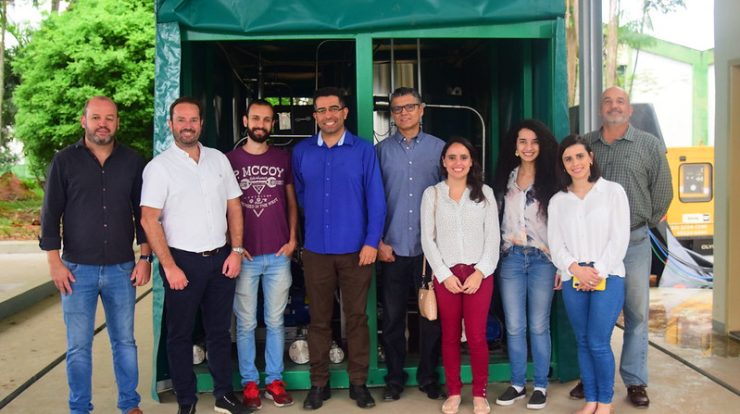

The meeting took place on Tuesday, the 19th, after the arrival of Greenfuels CEO James Higgett and representative in Latin America, Manuel Thompson Flores, to participate in the global workshop on sustainable aviation fuels, held by the Regional Center for Innovation and Technology Transfer (CRETE). The intent was to discuss the possibilities of implementing and expanding the use of sustainable fuels, as well as the possibility of growing this segment in Brazil and in the world.
During the visit to Cieptec, which was attended by Mayor Margarida Salomão, the group evaluated the start-up of the equipment, coming from England, for tests, research projects and possible partnerships. The Fuelmatic GSX3 machine currently works by receiving used cooking oil and converting it into biofuel that can be used in vehicles, boats and even in aviation, Reducing the effects of transportation on the environment.
According to UFJF’s Director of Innovation, Fabricio Campos, the foundation is working to unite important efforts in the field of renewable energies. “Our entrepreneurial spirit stands out in open research and development projects and innovation programs with companies, which allow our researchers to work at the frontiers of technologies.”
Professor Adilson da Silva, one of the pioneers in studying biodiesel at UFJF, explained the next stages of the project. “The first step will be commissioning (a process that ensures that the operating conditions are appropriate), when we get five thousand liters of biodiesel. A team will also be trained to participate in this work, with the participation of students, so that later we can have the continuous production of biodiesel” .
Exchange of experiences
According to the CEO of Greenfuels, James Hygate’s ability to work with the university’s expertise, as well as with the support of Juiz de Fora City Hall (PJF), is an opportunity to share knowledge. “It is great to see this small scale plant producing fuel from waste, which is still unusual in Latin America as a whole. But we see a great opportunity in which people can convert their waste in a local context to produce fuel for the road, for boats and, ultimately, for aviation,” As he points out. “I think the university can also learn from our experience and our technologies and the way we develop this equipment. So for us, it is one of those partnerships where both sides are win-win.”
clean energy
Greenfuels’ representative partner in Latin America, Manuel Thompson-Flôres, explained that the installation in Juiz de Fora is supported by a UK Collaboration Fund which, through a partnership with the Brazilian government, supports cities seeking to decarbonize. environment.
“This connection is like Show From the production of distributed energy to the search for alternatives and solutions that fit with this context of the modern economy, which talks in a circular manner and the sustainability and production of green fuels, in a rational way, and the achievement of the goals of the United Nations (United Nations). It is a concept for cities to make better use of their resources, turning waste into energy”, concludes Thomposn-Flôres.
Read more:
Oil of the future: producing renewable fuels from cooking oil

“Friendly zombie guru. Avid pop culture scholar. Freelance travel geek. Wannabe troublemaker. Coffee specialist.”






